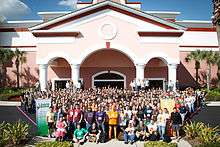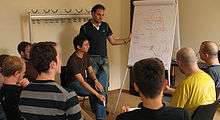Canonical (company)
|
| |
| Private company limited by shares[1] | |
| Industry | Computer software |
| Founded | 5 March 2004 |
| Founder | Mark Shuttleworth |
| Headquarters | London, United Kingdom |
Area served | Worldwide |
Key people |
Mark Shuttleworth (Executive Chairman) Jane Silber (CEO) |
| Products | Ubuntu, Launchpad, Bazaar, Landscape, Ubuntu One[2] |
| Revenue | US$65.7 million (2013)[3] |
Number of employees | 550+[4] |
| Subsidiaries |
Canonical Group Ltd Canonical USA Inc. Canonical China Ltd (Chinese: 科能软件股份有限公司) Canonical Brasil Ltda Canonical Canada Ltd Canonical Ltd Taiwan Br. (Chinese: 英屬曼島商肯諾有限公司臺灣分公司) |
| Website |
www |
|
Footnotes / references Formerly "M R S Virtual Development Ltd"[5] | |

Canonical Ltd.[6] is a UK-based privately held computer software company founded and funded by South African entrepreneur Mark Shuttleworth to market commercial support and related services for Ubuntu and related projects. Canonical employs staff in more than 30 countries and maintains offices in London, Austin, Boston, Shanghai, Beijing, Taipei and the Isle of Man.[4]
Projects
Canonical Ltd. has created and continues to back several projects. Principally these are free and open-source software (FOSS) or tools designed to improve collaboration between free software developers and contributors. Some projects require a Contributor License Agreement to be signed.
Open-source software
- Ubuntu,[7] a Debian-based Linux distribution with Unity (formerly with GNOME 2) desktop
- GNU Bazaar,[8] a decentralized revision control system
- Storm, an object-relational mapper for Python,[9] part of the Launchpad codebase
- Juju, a service orchestration management tool
- MAAS, a bare-metal server provisioning tool
- Upstart, an event-based replacement for the init daemon
- Quickly, a framework for creating software programs for Linux
- Ubiquity, installer
- Mir display server
- Snappy Ubuntu Core, tiny, transactional version of Ubuntu
- Snapcraft, python-based tool for packaging software
- Launchpad[10][11] a centralised website containing several component web applications designed to make collaboration between free software projects easier:
- PPA, a special software repository for uploading software packages to be built and published as an APT repository,
- Blueprints, a tool for planning features of software,
- Code, hosting of Bazaar branches,
- Answers, support tracker,
- Rosetta, an online language translation tool to help localisation of software (cf. the Rosetta Stone),
- Malone (as in "Bugsy Malone"), a collaborative bug-tracker that allows linking to other bug-trackers,
- Soyuz, a tool for creating custom-distributions, such as Kubuntu and Xubuntu.
Other projects and services
- Landscape,[12] a proprietary web service for centralized management of Ubuntu systems
- Ubuntu One, a discontinued service for file synchronization and other uses
- Canonical supplies some of the core engineering to Linaro which invests in upstream projects
- Ubuntu Advantage, a commercial support service that covers Ubuntu and other Canonical products
Joint ventures
Business plans
In a Guardian interview in May 2008, Shuttleworth said that the Canonical business model was service provision and explained that Canonical was not yet close to profitability. Canonical also claimed it would wait for the business to turn into a profitable one within another three to five years. Shuttleworth regarded Canonical as positioning itself as demand for services related to free software rose.[13] This strategy has been compared to Red Hat's business strategies in the 1990s.[14] In an early 2009 New York Times article, Shuttleworth said that Canonical's revenue was "creeping" towards $30 million, the company's break-even point.[15] However, as of 2013 the company was again in investment mode, making a $21.3 million loss as it invested in mobile.
In 2007, Canonical launched an International online shop selling support services and Ubuntu branded goods; later in 2008 it expanded that with a United States-specific shop designed to reduce shipment times.[16] At the same time, the word Ubuntu was trademarked in connection with clothing and accessories.[17]
Subsidiaries
- Canonical Group Ltd is located in London.
- Canonical USA Inc. is located in Lexington, Massachusetts.
- Canonical China Ltd (Chinese: 科能软件股份有限公司) is located in Shanghai.
- Canonical Brasil Ltda is located in São Paulo.
- Canonical Canada Ltd is located in Montreal (the office is no longer in service[18]).
- Canonical Ltd Taiwan Br. (Chinese: 英屬曼島商肯諾有限公司臺灣分公司) is located in Taipei.
Employees

Canonical has more than 500 employees.[4] The head office is in London on the 5th Floor of the Blue Fin Building, Southwark Street,[19] having previously moved from the 27th floor of Millbank Tower.[20] In the summer of 2006, Canonical opened an office in Montreal to house its global support and services operation.[14] Taipei 101 is also home to a Canonical office.[21] There is also an OEM team in Lexington, Massachusetts, United States.[22]
Current
Notable current employees of Canonical include:
- Mark Shuttleworth, CEO and founder of the Ubuntu project, former Debian maintainer of Apache and founder of Thawte Consulting (2004–), CEO until March 2010
- Jane Silber, Board of Directors,[23] formerly CEO (March 2010-July 2017); formerly COO and leader of the Ubuntu One project
Past
Notable past employees:
- Ben Collins, former Debian Project Leader and kernel developer (2006–2009)
- Jeff Waugh, employee no. 3, GNOME and Planet aggregator developer, Business Development (2004–2006)
- Benjamin Mako Hill, core developer and community coordinator (2004–2005)
- Ian Jackson, developer of dpkg and former Debian Project Leader (2005–2007)
- Lars Wirzenius, first contributor to the Linux kernel and Linus Torvalds' former office mate (2007–2009)
- Scott James Remnant, formerly a Debian and GNU maintainer of GNU Libtool and co-author of the Planet aggregator (2004–2011)[24]
- Matt Zimmerman, formerly of the Debian security team – worked at Canonical as Ubuntu Chief Technical Officer (2004–2011)[25]
- John D. Bernard, was responsible for all major marketing deployments (2009–2012)
- Stuart Langridge (2009–2013)
- Jono Bacon, Ubuntu community leader (2006–2014)
References
- ↑ The Isle of Man Companies Registry, Annual Return 2005 for Company no. 110334C (non-distributable, available for a fee of £1.00)
- ↑ "Overview". Canonical. Retrieved 2013-09-27.
- ↑ Brodkin, Jon (13 January 2014). "Ubuntu maker boosted revenue in 2013 but doubled loss to $21 million". Ars Technica. Retrieved 9 May 2015.
- 1 2 3 "About Canonical". Canonical Ltd. Retrieved 2012-08-20.
We've come a long way since our launch in 2004. We now have over 800 staff in more than 42 countries, and offices in London, Austin, Boston, Taipei, Montreal, Shanghai, São Paulo and the Isle of Man.
- ↑ "Company no. 110334C". The Isle of Man Companies Registry. Retrieved 2005-05-18.
[ Previous names: ] M R S VIRTUAL DEVELOPMENT LIMITED [ Name type: ] PREVIOUS
- ↑ UK registered trademark #EU004059218 "CANONICAL", filed 29 September 2004.
- ↑ UK registered trademark #EU004059119 "UBUNTU", filed 29 September 2004.
- ↑ UK registered trademark #EU005152467 "BAZAAR", filed 21 June 2006.
- ↑ "Canonical Releases Storm as Open Source". Ubuntu.com. 9 July 2007. Retrieved 2013-09-27.
- ↑ UK registered trademark #EU006251219 "LAUNCHPAD", filed 4 September 2007.
- ↑ "Canonical releases source code for Launchpad". Canonical Ltd. Retrieved 18 July 2012.
- ↑ UK registered trademark #EU005152418 "LANDSCAPE", filed 21 June 2006, published 6 August 2007.
- ↑ Moody, Glyn (22 May 2008). "'Linux is a platform for people, not just specialists'". London: The Guardian. Retrieved 2008-05-23.
- 1 2 Shankland, Stephen (6 October 2006). "Canonical seeks profit from free Ubuntu". C|NET. Retrieved 2007-10-19.
- ↑ "A Software Populist Who Doesn’t Do Windows". The New York Times. 11 January 2009. Retrieved 2010-11-08.
- ↑ "Canonical launches U.S.-based shop.ubuntu.com in time for holiday season". Ubuntu Insights. Canonical Ltd. 20 November 2008. Retrieved 2015-06-28.
Canonical launched today an U.S.-based on-line shop for Ubuntu-branded merchandise and software. With a new fulfillment house in St. Louis, Missouri, shipments are faster and less expensive for Ubuntu users and enthusiasts in the U.S
- ↑ "UK registered trademark #EU007426265". UK Intellectual Property Office. 27 November 2008. Retrieved 2009-02-09.
Mark text: UBUNTU ... Class 16: Stationery; ... Class 18: Luggage; ... Class 25: Articles of clothing ... CANONICAL LIMITED
- ↑ ""LOCO Team Portal: Canonical Offices Montreal"". Canonical. Retrieved 2016-06-04.
- ↑ "Ways to contact". Canonical. Retrieved 2013-09-27.
- ↑ "("Where?")". Bazaar-vcs.org. 18 May 2007. Retrieved 2013-09-27.
- ↑ "Canonical Taiwan Branch @ Rm D, 46th floor, Taipei 101 building | Flickr - Photo Sharing!". Flickr. 26 February 2009. Retrieved 2013-09-27.
- ↑ "Ubuntu for Android". Canonical Ltd. Archived from the original on 23 February 2012. Retrieved 21 February 2012.
We have over 500 staff in more than 30 countries, with offices in London, Boston, Taipei, Montreal, Shanghai, and São Paulo.
- ↑ "A new vantage point". 12 April 2017. Retrieved 2017-04-12.
- ↑ Remnant, Scott James. "Leaving Canonical". Retrieved 2011-01-22.
- ↑ "Matt Zimmerman leaving Canonical". 6 May 2011. Retrieved 2013-04-07.
